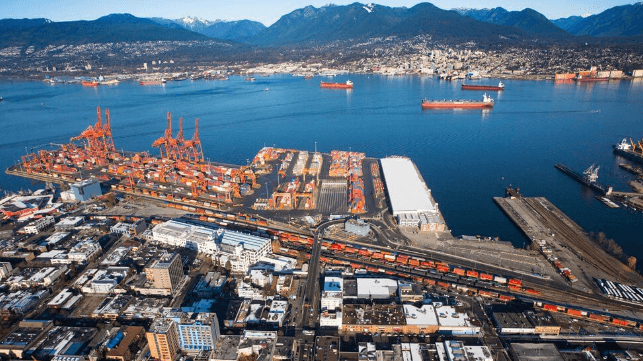Canadian Dockworkers Vote in Favor of Four-Year Contract for BC Ports

The International Longshore and Warehouse Union Canada confirmed that three-quarters of its membership had voted in favor of the new four-year contract for work in Canada’s West Coast ports bringing to an end five months of negotiations and 35 days of disruption at the ports. The employers represented by the British Columbia Maritime Employers Association (BCMEA) voted to accept the contract terms after they were negotiated by the Canada Industrial Relations Board which was called in by the government to help resolve several impasses between the two sides.
Terms of the final agreement were not announced by either side. Earlier reports had said the agreement included a better than 19 percent wage increase as well as improvements to the pension and benefits. The union strike cited issues including inflation, the workers’ efforts at keeping the supply chain moving during the pandemic, and the need to address job security at the beginning of July when they went out on strike for two weeks. The primary sticking point was believed to be over outsourcing by the employees of maintenance work at the terminals as well as the union’s goal to limit future automation at the ports.
“The renewed collective agreement includes increases in wages, benefits, and training that recognizes the skills and efforts of B.C.’s waterfront workforce, while providing certainty and stability for the future of Canada’s West Coast ports,” BCMEA said in a statement after the vote. “As we move forward to implement the terms of the agreement, we are committed to working collaboratively with our labor partners, the federal government, and key stakeholders to rebuild the reputation of Canada’s largest gateway.”
The government used the mediation process after two prior agreements had fallen apart. After bringing about the new agreement a week ago, Canadian law gave the union less than a week to present the proposed terms to its membership for a vote with the government mediators cautioning if the union did not proceed it could be considered a breach. Despite that, observers cautioned that acceptance was not a certainty and some factions continued to lobby for members to reject the proposed terms for a second time.
Government officials as well as Canadian businesses welcomed the news of the acceptance with the BCMEA saying in its statement that it “regrets the profound repercussions this labor disruption has had on the national economy.”
Canadian Labor Minister Seamus O’Regan and Deputy Transport Minister Pablo Rodriguez released a joint statement calling the vote good news for Canada. They highlighted the government’s belief that the collective bargaining process had worked and provided the best outcome.

that matters most
Get the latest maritime news delivered to your inbox daily.
O’Regan however also directed federal officials to review how a disruption on this scale unfolded, “so that in the future we can provide greater stability for the workers and businesses across Canada that depend on our BC ports.” O’Regan reiterated his earlier statement, “We do not want to be back here again.”
The Railway Association of Canada had estimated that it would take three to five days for networks and supply chains to recover for every day of the port strike. Canada’s two major railroads said it could require two months to fully recover from container delays and volume that was waiting to be moved.
